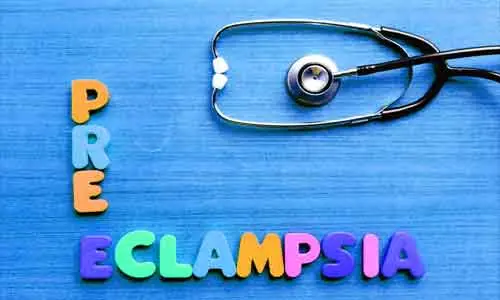- Home
- Medical news & Guidelines
- Anesthesiology
- Cardiology and CTVS
- Critical Care
- Dentistry
- Dermatology
- Diabetes and Endocrinology
- ENT
- Gastroenterology
- Medicine
- Nephrology
- Neurology
- Obstretics-Gynaecology
- Oncology
- Ophthalmology
- Orthopaedics
- Pediatrics-Neonatology
- Psychiatry
- Pulmonology
- Radiology
- Surgery
- Urology
- Laboratory Medicine
- Diet
- Nursing
- Paramedical
- Physiotherapy
- Health news
- Fact Check
- Bone Health Fact Check
- Brain Health Fact Check
- Cancer Related Fact Check
- Child Care Fact Check
- Dental and oral health fact check
- Diabetes and metabolic health fact check
- Diet and Nutrition Fact Check
- Eye and ENT Care Fact Check
- Fitness fact check
- Gut health fact check
- Heart health fact check
- Kidney health fact check
- Medical education fact check
- Men's health fact check
- Respiratory fact check
- Skin and hair care fact check
- Vaccine and Immunization fact check
- Women's health fact check
- AYUSH
- State News
- Andaman and Nicobar Islands
- Andhra Pradesh
- Arunachal Pradesh
- Assam
- Bihar
- Chandigarh
- Chattisgarh
- Dadra and Nagar Haveli
- Daman and Diu
- Delhi
- Goa
- Gujarat
- Haryana
- Himachal Pradesh
- Jammu & Kashmir
- Jharkhand
- Karnataka
- Kerala
- Ladakh
- Lakshadweep
- Madhya Pradesh
- Maharashtra
- Manipur
- Meghalaya
- Mizoram
- Nagaland
- Odisha
- Puducherry
- Punjab
- Rajasthan
- Sikkim
- Tamil Nadu
- Telangana
- Tripura
- Uttar Pradesh
- Uttrakhand
- West Bengal
- Medical Education
- Industry
Half of pregnant women with pre-eclampsia miss out on preventive aspirin: Study

More than half of mums-to-be who are at risk of the dangerously high blood pressure condition, pre-eclampsia, are missing out on preventive aspirin treatment, says an expert in an editorial published online in Drug and Therapeutics Bulletin.
Making aspirin available from local pharmacies could help ward off the condition, says consultant obstetrician Dr Joanna Girling of West Middlesex University Hospital, London.
Pre-eclampsia is the leading cause of premature birth, restricted fetal growth, and stillbirth and it increases the risk of hospital admission for the expectant mother before the birth.
Risk factors include: chronic high blood pressure; underlying kidney disease; autoimmune disease such as rheumatoid arthritis; high blood pressure in a previous pregnancy; diabetes; older age (40+); obesity; more than 10 years since the previous pregnancy; or a family history of pre-eclampsia.
National guidelines recommend that women at risk of pre-eclampsia should begin to take preventive low dose aspirin at 12 weeks of pregnancy.
"So why is it that despite compelling evidence for its benefit and safety, more than 50% of eligible pregnant women never start aspirin?" asks the author.
Concerns about taking any drugs during pregnancy and logistical issues, such as midwives in most maternity units not having legal powers to prescribe or supply aspirin, may account for the figures, she suggests.
When midwives can't prescribe, they advise mums-to-be to see their local GP to get a prescription, but this obviously takes time, risking delays in the start of preventive treatment, or not starting it at all, says Dr Girling.
The easiest option would be to enable at-risk women to obtain supplies of low dose aspirin from their local pharmacy. It could be a lot cheaper than the "unnecessary branded pregnancy related nutrients and supplements that many women choose to buy," she suggests.
But the snag is that many pharmacists can't legally sell aspirin to ward off pre-eclmapsia because it is not officially marketed for the treatment of the condition.
While some may be concerned that this suggests the use of aspirin for pre-eclampsia is unsafe, the absence of an official license for this indication is most likely for commercial reasons, because it's unlikely to be financially worthwhile, explains Dr Girling.
But it makes no medical, financial, or common sense to disallow access to the drug in local pharmacies, she contends.
"If we are serious about increasing uptake of a nationally recommended, evidence-based, life-saving, low-cost intervention, how about developing a national [protocol] to allow community pharmacists to supply low-dose aspirin to women who are at risk of pre-eclampsia," she suggests.
For further reference log on to:
Dr Kamal Kant Kohli-MBBS, DTCD- a chest specialist with more than 30 years of practice and a flair for writing clinical articles, Dr Kamal Kant Kohli joined Medical Dialogues as a Chief Editor of Medical News. Besides writing articles, as an editor, he proofreads and verifies all the medical content published on Medical Dialogues including those coming from journals, studies,medical conferences,guidelines etc. Email: drkohli@medicaldialogues.in. Contact no. 011-43720751


